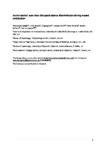At‐risk alcohol users have disrupted valence discrimination during reward anticipation
| dc.contributor.author | Komarnyckyj, M | |
| dc.contributor.author | Retzler, C | |
| dc.contributor.author | Cao, Z | |
| dc.contributor.author | Ganis, Giorgio | |
| dc.contributor.author | Murphy, A | |
| dc.contributor.author | Whelan, R | |
| dc.contributor.author | Fouragnan, Elsa | |
| dc.date.accessioned | 2022-04-08T15:23:27Z | |
| dc.date.available | 2022-04-08T15:23:27Z | |
| dc.date.issued | 2022-05 | |
| dc.identifier.issn | 1355-6215 | |
| dc.identifier.issn | 1369-1600 | |
| dc.identifier.other | e13174 | |
| dc.identifier.uri | http://hdl.handle.net/10026.1/19026 | |
| dc.description | File replaced (incorrect version) on 22/4/2022 by KT (LDS). | |
| dc.description.abstract |
<jats:title>Abstract</jats:title><jats:p>Alcohol use disorder is characterised by disrupted reward learning, underpinned by dysfunctional cortico‐striatal reward pathways, although relatively little is known about the biology of reward processing in populations who engage in risky alcohol use. Cues that trigger reward anticipation can be categorized according to their learnt valence (i.e., positive vs. negative outcomes) and motivational salience (i.e., incentive vs. neutral cues). Separating EEG signals associated with these dimensions is challenging because of their inherent collinearity, but the recent application of machine learning methods to single EEG trials affords a solution. Here, the Alcohol Use Disorders Identification Test (AUDIT) was used to quantify risky alcohol use, with participants split into high alcohol (HA) (<jats:italic>n</jats:italic> = 22, mean AUDIT score: 13.82) and low alcohol (LA) (<jats:italic>n</jats:italic> = 22, mean AUDIT score: 5.77) groups. We applied machine learning multivariate single‐trial classification to the electroencephalography (EEG) data collected during reward anticipation. The LA group demonstrated significant valence discrimination in the early stages of reward anticipation within the cue‐P3 time window (400–550 ms), whereas the HA group was insensitive to valence within this time window. Notably, the LA, but not the HA group demonstrated a relationship between single‐trial variability in the early valence component and reaction times for gain and loss trials. This study evidences disrupted hypoactive valence sensitivity in the HA group, revealing potential neurophysiological markers for risky drinking behaviours which place individuals at‐risk of adverse health events.</jats:p> | |
| dc.format.extent | e13174- | |
| dc.format.medium | ||
| dc.language | en | |
| dc.language.iso | en | |
| dc.publisher | Wiley | |
| dc.rights | Attribution 4.0 International | |
| dc.rights.uri | http://creativecommons.org/licenses/by/4.0/ | |
| dc.subject | alcohol | |
| dc.subject | AUDIT | |
| dc.subject | EEG | |
| dc.subject | humans | |
| dc.subject | machine learning | |
| dc.subject | reward | |
| dc.title | At‐risk alcohol users have disrupted valence discrimination during reward anticipation | |
| dc.type | journal-article | |
| dc.type | Journal Article | |
| dc.type | Research Support, Non-U.S. Gov't | |
| plymouth.author-url | https://www.webofscience.com/api/gateway?GWVersion=2&SrcApp=PARTNER_APP&SrcAuth=LinksAMR&KeyUT=WOS:000779049600001&DestLinkType=FullRecord&DestApp=ALL_WOS&UsrCustomerID=11bb513d99f797142bcfeffcc58ea008 | |
| plymouth.issue | 3 | |
| plymouth.volume | 27 | |
| plymouth.publication-status | Published | |
| plymouth.journal | Addiction Biology | |
| dc.identifier.doi | 10.1111/adb.13174 | |
| plymouth.organisational-group | /Plymouth | |
| plymouth.organisational-group | /Plymouth/Faculty of Health | |
| plymouth.organisational-group | /Plymouth/Faculty of Health/School of Psychology | |
| plymouth.organisational-group | /Plymouth/REF 2021 Researchers by UoA | |
| plymouth.organisational-group | /Plymouth/REF 2021 Researchers by UoA/UoA04 Psychology, Psychiatry and Neuroscience | |
| plymouth.organisational-group | /Plymouth/Users by role | |
| plymouth.organisational-group | /Plymouth/Users by role/Academics | |
| plymouth.organisational-group | /Plymouth/Users by role/Researchers in ResearchFish submission | |
| dc.publisher.place | United States | |
| dcterms.dateAccepted | 2022-03-18 | |
| dc.rights.embargodate | 2022-4-22 | |
| dc.identifier.eissn | 1369-1600 | |
| dc.rights.embargoperiod | Not known | |
| rioxxterms.funder | Medical Research Council | |
| rioxxterms.identifier.project | Mapping the neural basis of credit assignment for a new targeted intervention in addiction | |
| rioxxterms.versionofrecord | 10.1111/adb.13174 | |
| rioxxterms.licenseref.uri | http://creativecommons.org/licenses/by/4.0/ | |
| rioxxterms.type | Journal Article/Review | |
| plymouth.funder | Mapping the neural basis of credit assignment for a new targeted intervention in addiction::Medical Research Council |



